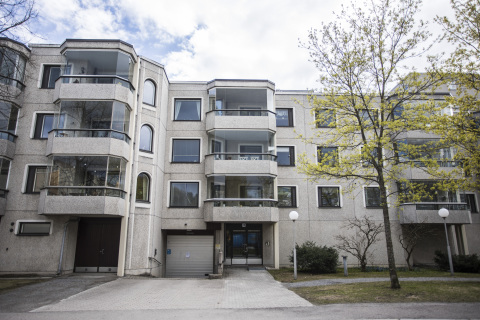Tampere, Finland:
Concrete is widely used as a construction material, but it has a substantial environmental impact. When a building is demolished, what happens to all the concrete? Tampere University, Finland, is coordinating the new international ReCreate project, which aims to discover how used concrete elements can be deconstructed without damaging them and reused in new buildings – and to turn the process into a profitable business. The four-year project has received €12.5 million of funding under the EU’s Horizon 2020 programme.
This press release features multimedia. View the full release here: https://www.businesswire.com/news/home/20210524005850/en/

When a building is demolished, what happens to all the concrete? Tampere University, Finland, is coordinating the new international ReCreate project, which aims to discover how used concrete elements can be deconstructed without damaging them and reused in new buildings – and to turn the process into a profitable business. Photo by Tampere University.
Concrete has been the world’s most commonly used building material for at least half a century. It accounts for the majority of both construction materials and demolition waste. In Europe, concrete buildings are commonly constructed using precast concrete elements. If the old elements could be reused instead of manufacturing new ones, it would bring major benefits for the environment.
“By reusing concrete elements, we can save an enormous amount of energy and raw materials,” says Satu Huuhka, adjunct professor at the Faculty of Built Environment at Tampere University, who leads the ReCreate project.
The recently launched international ReCreate project (2021–2025) coordinated by Tampere University seeks to find new uses for the concrete elements of condemned buildings in the construction of new buildings. The four-year project has received funding under the European Union’s Horizon 2020 call, and it seeks solutions for reusing construction and demolition waste. The project has an overall budget of €12.5 million. The project involves universities and regional company clusters in four countries: Finland, Sweden, the Netherlands, and Germany. The communications partner is the Croatia Green Building Council. All the country clusters will carry out their own pilot projects where they deconstruct precast concrete elements intact and reuse them in a new building.
“We are specifically looking to reuse the concrete elements as a whole, not as a raw material for something new,” Huuhka points out.
Tapping into Finland’s world-class expertise
Researchers at the Faculty of Built Environment have been carrying out ground-breaking research into the circular economy in the construction sector for a decade. In addition, long-term research on renovation and the lifecycle engineering of structures provides a solid foundation for the development of quality assurance procedures that will ensure the safety and integrity of the reused elements. This time, the researchers are set to explore not only the technical implementation of the solutions but also the business perspective.
“There are many questions to be answered. How do we deconstruct the elements from buildings without damaging them? How do we assess their structural integrity? How do we recertify the salvaged elements and turn them into a product that meets building code requirements? Since the elements are not of uniform quality, how can we turn this into a viable business? We must also consider the social aspects: does the process require new skills or new ways of working?” Huuhka asks.
Tampere University researchers will also bring to the project their specialist expertise in circular economy business models, building regulations and law, and occupational sociology. The Finnish country cluster comprises Tampere University, the construction company Skanska, the demolition company Umacon, the precast concrete company Consolis Parma, the engineering and consultancy company Ramboll, the architecture firm Liike Oy Arkkitehtistudio and the City of Tampere.
Tampere University
The multidisciplinary Tampere University is the second largest university in Finland. The spearheads of our research and learning are technology, health and society. The University is committed to addressing the greatest challenges that are facing our society and creating new opportunities. Almost all the internationally recognised fields of study are represented at the University. Together Tampere University and Tampere University of Applied Sciences comprise the Tampere Universities community made up of more than 30,000 students and close to 5,000 employees.www.tuni.fi/en
View source version on businesswire.com: https://www.businesswire.com/news/home/20210524005850/en/







